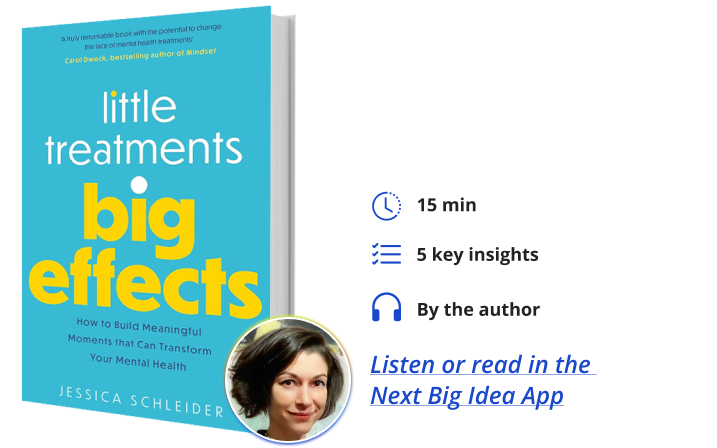Jessica Schleider is a psychology professor, intervention scientist, and director of the Lab for Scalable Mental Health at Northwestern University.
Below, Jessica shares 5 key insights from her new book, Little Treatments, Big Effects: How to Build Meaningful Moments that Can Transform Your Mental Health. Listen to the audio version—read by Jessica herself—in the Next Big Idea App.

1. There is a global mental health crisis—and it’s only getting worse.
Most people with mental health needs get no treatment at all. This gap is a feature, not a bug, of how care is delivered. Generally, mental health care happens in brick-and-mortar, hard-to-access clinics; it’s carried out by highly trained professionals over long periods of time. If the number of licensed therapists magically doubled overnight, provider shortages would still be insurmountable. Waiting lists would still be months to years long. Treatment would still be unaffordable, and insurance coverage unreliable. The process of finding a therapist would still resemble a maze of pointless, unfunny riddles, with answers that shift by the day—perfectly constructed to deter those most desperate for help.
Worst of all, even among people who do access treatment, the most common number of sessions received is just one. Yet, most evidence-based mental health therapies are meant to last between twelve and twenty sessions.
We’re overdue for radical change in where, when, and how mental health support can be delivered. These changes must include support that people can access at moments of need, before they reach crisis points—before it’s too late for help to matter.
2. Single-session interventions (SSIs) can revolutionize mental health care.
SSIs are structured programs that intentionally involve only one encounter with a provider or program; they can serve as stand-alone or add-on services to other forms of care. Importantly, SSIs are a “one-at-a-time” mode of support, meaning that while they may be accessed on many occasions, any one session is designed to yield positive change.
SSIs acknowledge that a therapeutic experience is often someone’s last, but it can be genuinely helpful anyway. Any moment can serve as a turning point, spurring upward spirals toward meaningful change. These interventions are scalable, flexible, and useful; some are therapist-led, and others are self-guided—that is, they are offered online, anonymously, and free of charge. They can bridge previously unfillable gaps in treatment systems by being embedded into spaces where no supports exist.
“Rather than trying to fix what clients lack, SSIs help clients harness their existing strengths to bring about changes they wish to see, one small but meaningful step at a time.”
SSIs flip the script on mental health treatment as we know it. They challenge assumptions that “more treatment is better” and that real change can only happen over very long periods of treatment. With SSIs, there is no expected length of therapy. There are no missed sessions. Only singular, stand-alone opportunities to create positive change—turning points where something profound shifts for the person seeking help. Opening doors to turning points is what SSIs do best.
Along those lines, SSIs also challenge the “deficit” focus of most therapies available. A core assumption of SSIs is that all people have inner strengths and capabilities, including the ability to bring about positive change in their lives. This might not sound like a radical idea in mental health care, but in fact, most modern therapies are based on a deficit model, which assumes that people lack the skills they need to cope with their problems. Rather than trying to fix what clients lack, SSIs help clients harness their existing strengths to bring about changes they wish to see, one small but meaningful step at a time.
SSIs are tools of empowerment. They help people craft moments that matter, whenever and wherever they seek support. They embrace the global reality that many people will only access mental health care once. SSIs are built for mental healthcare systems as they currently exist—not the mental healthcare systems we would prefer they become.
3. Single-session interventions work.
In 2016, as a clinical psychology graduate student, I grew increasingly interested in how to maximize the odds that a client’s first (and possibly only) session could truly help them. So, as a youth-focused trainee, I launched a review project (called a meta-analysis) to learn whether single-session interventions could benefit children and teens.
It turned out I was far from the first person to ask this question. My project compiled findings from 50 randomized controlled trials, including 10,508 young people across five continents. We saw that SSIs significantly reduced a wide range of youth mental health problems, with only slightly smaller effects on symptom levels than multi-session treatments. Their positive effects were no different for youth with more or less serious problems, or for youth with or without a formal diagnosis.
Our findings also supported the promise of online SSIs: positive effects emerged even for self-guided programs (digital interventions that did not involve any therapist). Beyond this project, dozens of other clinical trials have suggested that SSIs can benefit adults with anxiety, panic attacks, depression, substance use, and chronic pain. The collective results of more than seventy clinical trials tell us that SSIs can actually work.
“These programs are helping people on waitlists for therapy, lending support when they first reach out for help, and online, where most young people first seek mental health support.”
Building on this science, which dates back to the 1990s, my research lab has developed a suite of effective, digital SSIs—based on bite-sized principles of cognitive-behavioral, solution-focused, and strengths-based therapies—that have reached over 50,000 youth and adults to date. Across our clinical trials, SSIs have helped lessen depression, anxiety, and disordered eating—even several months later.
These programs are helping people on waitlists for therapy, lending support when they first reach out for help, and online, where most young people first seek mental health support. Our programs have even been embedded within social media platforms, where they are offered to people immediately after they search for terms like “suicide” or “depression.” That is, they offer support at precise moments of need regardless of access to traditional forms of care. SSIs are already filling gaps in treatment systems across the US and worldwide.
4. Meaningful moments show how single-session interventions can make change.
It’s one thing for clinical trials to say that SSIs can help. It’s another to hear people’s personal stories of meaningful moments in their recovery.
For my book, I collected 98 stories of turning points from incredibly generous volunteers, all of whom resonated with the experience of having a brief experience with an outsized impact on their recovery from mental illness. Through their written responses and follow-up interviews, I identified five themes that seemed to underlie almost all the turning points that people shared:
- Surprising yourself. Doing something, even something small, you were once certain you could not.
- Feeling seen. Experiencing newfound validation from others. Feeling genuinely and fully understood.
- Seeing others. Discovering that other people are going through or have overcome similar struggles. Feeling less alone and more supported.
- Reclaiming your narrative. Realizing the future you want, and taking a first step toward making that future possible.
- Giving back. Feeling empowered by supporting others through struggles similar to your own.
My book includes a tapestry of personal narratives that bring these themes to life. Hearing each one felt like its own SSI, just for me. As one interviewee stated: “The opportunities for turning points are there for everyone. Whether or not everyone is able to experience [them] is another question.”
SSIs can create opportunities to experience a new turning point that fosters positive change or to make meaning of a turning point that has already occurred but that you may not have considered. They can help you understand your own strengths and how to apply them in new and unexpected ways. I’m so proud to share with the world 98 stories that show us how.
5. You can take steps right now to create moments that matter in your own life.
There are many simple steps that healthcare leaders, therapists, and other professionals can take to start offering SSIs to more people right now, but you can take the initiative yourself, too. My book includes four activities that are made for anybody to try, whenever and wherever they like, that draw on the evidence-backed SSIs that my research team has created.
Some of them highlight key turning point themes. As you read the book, and long after, you can try each activity just once or many times— on your own, with a friend, or with a therapist. The same activity could lead to different ideas, emotions, and conclusions at different times. These tools are not meant to replace formal therapy. At the same time, meaningful change can happen at any moment, including this one.
To listen to the audio version read by author Jessica Schleider, download the Next Big Idea App today:































